Nuove risorse elettroniche di Scienze politiche e sociali
Tra le recenti acquisizioni di ebook alcune enciclopedie e dizionari di Scienze politiche e sociali attualmente disponibili (cliccare sul titolo o sull'immagine per accedervi):
Moghaddam, F. M. (2017). The SAGE Encyclopedia of Political Behavior. Thousand Oaks, California: SAGE Publications, Inc.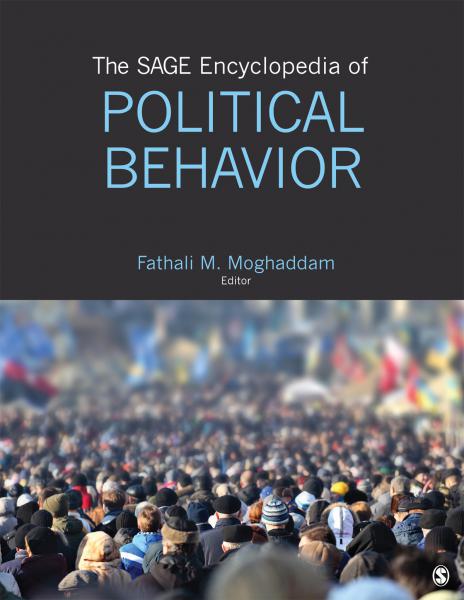 The SAGE Encyclopedia of Political Behavior explores the intersection of psychology, political science, sociology, and human behavior. This encyclopedia integrates theories, research, and case studies from a variety of disciplines that inform this established area of study. Aimed at college and university students, this one-of-a-kind book covers voting patterns, interactions between groups, what makes different types of government systems appealing to different societies, and the impact of early childhood development on political beliefs, among others. Topics explored by political psychologists are of great interest in fields beyond either psychology or political science, with implications, for instance, within business and management.
The SAGE Encyclopedia of Political Behavior explores the intersection of psychology, political science, sociology, and human behavior. This encyclopedia integrates theories, research, and case studies from a variety of disciplines that inform this established area of study. Aimed at college and university students, this one-of-a-kind book covers voting patterns, interactions between groups, what makes different types of government systems appealing to different societies, and the impact of early childhood development on political beliefs, among others. Topics explored by political psychologists are of great interest in fields beyond either psychology or political science, with implications, for instance, within business and management.
Mitchell, G. D. (2017). A New Dictionary of the Social Sciences. London: Routledge.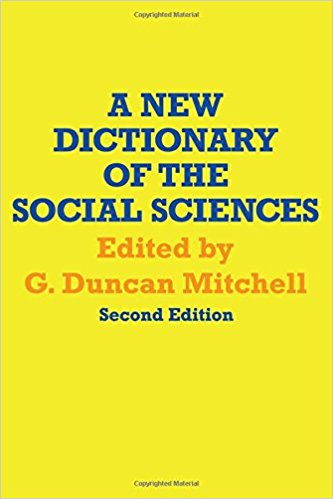 Designed especially to meet the needs of beginners in all the social sciences,'A New Dictionary of the Social Sciences'follows its highly successful distinguished predecessor initially issued as'A Dictionary of Sociology'first published in 1968. Many of the entries have been revised and updated to keep abreast of the proliferation in the vocabulary of the social sciences. The volume remains on excellent single source for definitions in social research. The entries include social psychological terms, terms in social and cultural anthropology, terms common to political science, social administration and social work. In the choice of words, a generous definition of social science was employed, making the dictionary a very useful reference source for all beginners in the social sciences. Some terms are explained quite briefly while others are given lengthy treatment, according to the further assumptions that some sociological terms can imply. Thus, long entries are given on words, such as authority, consensus, phenomenology, role, social stratification, structuralism, whereas short and succinct entries suffice for words such, as agnate, eidos, or mores. A number of short biographical sketches are also included. The contributors are all scholars working in universities, predominantly in the United Kingdom and the United States. More than a glossary,'A New Dictionary of the Social Sciences'helps the student understand some of the theoretical considerations underlying the use of sociological terms, as well as something of their history, and therefore resembles an encyclopaedia in its scope and depth of information.
Designed especially to meet the needs of beginners in all the social sciences,'A New Dictionary of the Social Sciences'follows its highly successful distinguished predecessor initially issued as'A Dictionary of Sociology'first published in 1968. Many of the entries have been revised and updated to keep abreast of the proliferation in the vocabulary of the social sciences. The volume remains on excellent single source for definitions in social research. The entries include social psychological terms, terms in social and cultural anthropology, terms common to political science, social administration and social work. In the choice of words, a generous definition of social science was employed, making the dictionary a very useful reference source for all beginners in the social sciences. Some terms are explained quite briefly while others are given lengthy treatment, according to the further assumptions that some sociological terms can imply. Thus, long entries are given on words, such as authority, consensus, phenomenology, role, social stratification, structuralism, whereas short and succinct entries suffice for words such, as agnate, eidos, or mores. A number of short biographical sketches are also included. The contributors are all scholars working in universities, predominantly in the United Kingdom and the United States. More than a glossary,'A New Dictionary of the Social Sciences'helps the student understand some of the theoretical considerations underlying the use of sociological terms, as well as something of their history, and therefore resembles an encyclopaedia in its scope and depth of information.
Doyle, T. E., Gorman, R. F., & Mihalkanin, E. S. (2016). Historical Dictionary of Human Rights and Humanitarian Organizations. Lanham: Rowman & Littlefield Publishers.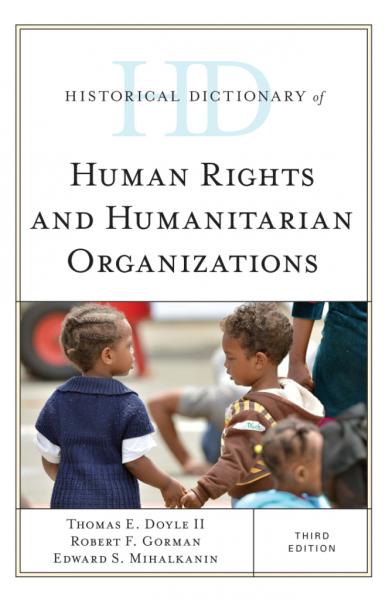 The Historical Dictionary of Human Rights and Humanitarian Organizations, Third Edition defines the core concepts of human rights and humanitarian law. It relates the major international legal agreements related to human rights and names the diverse intergovernmental organizations which are responsible for implementing and maintaining these legal declarations, charters, conventions, or treaties. It also names and describes the several international non-governmental organizations which lobby states and international organizations with respect to human rights, which carry out programs of humanitarian assistance or relief, and which have played such a significant role in the evolution of human rights and humanitarianism in the modern era. Finally, it features the names and biographical accounts of major figures in the history of human rights and humanitarianism, along with figures that are active today on these issues. This third edition of Historical Dictionary of Human Rights and Humanitarian Organizations contains a chronology, an introduction, appendixes, and an extensive bibliography. The dictionary section has over 700 cross-referenced entries on human rights concepts, major pieces of international law on human rights and humanitarian issues, major intergovernmental bodies responsible for implementing international laws on human rights and humanitarian issues, major international non-governmental organizations whose work focuses on human rights and humanitarian issues, and the names of important historical and contemporary figures who have contributed to the establishment and progress of human rights and humanitarianism.. This book is an excellent access point for students, researchers, and anyone wanting to know more about Human Rights.
The Historical Dictionary of Human Rights and Humanitarian Organizations, Third Edition defines the core concepts of human rights and humanitarian law. It relates the major international legal agreements related to human rights and names the diverse intergovernmental organizations which are responsible for implementing and maintaining these legal declarations, charters, conventions, or treaties. It also names and describes the several international non-governmental organizations which lobby states and international organizations with respect to human rights, which carry out programs of humanitarian assistance or relief, and which have played such a significant role in the evolution of human rights and humanitarianism in the modern era. Finally, it features the names and biographical accounts of major figures in the history of human rights and humanitarianism, along with figures that are active today on these issues. This third edition of Historical Dictionary of Human Rights and Humanitarian Organizations contains a chronology, an introduction, appendixes, and an extensive bibliography. The dictionary section has over 700 cross-referenced entries on human rights concepts, major pieces of international law on human rights and humanitarian issues, major intergovernmental bodies responsible for implementing international laws on human rights and humanitarian issues, major international non-governmental organizations whose work focuses on human rights and humanitarian issues, and the names of important historical and contemporary figures who have contributed to the establishment and progress of human rights and humanitarianism.. This book is an excellent access point for students, researchers, and anyone wanting to know more about Human Rights.
Treas, J., Scott, J. L., & Richards, M. (2014). The Wiley Blackwell Companion to the Sociology of Families. Chichester, West Sussex, UK: Wiley-Blackwell. Written by an international team of experts, this comprehensive volume investigates modern-day family relationships, partnering, and parenting set against a backdrop of rapid social, economic, cultural, and technological change. Covers a broad range of topics, including social inequality, parenting practices, children's work, changing patterns of citizenship, multi-cultural families, and changes in welfare state protection for families Includes many European, North American and Asian examples written by a team of experts from across five continents Features coverage of previously neglected groups, including immigrant and transnational families as well as families of gays and lesbians Demonstrates how studying social change in families is fundamental for understanding the transformations in individual and social life across the globe Extensively reworked from the original Companion published over a decade ago: three-quarters of the material is completely new, and the remainder has been comprehensively updated
Written by an international team of experts, this comprehensive volume investigates modern-day family relationships, partnering, and parenting set against a backdrop of rapid social, economic, cultural, and technological change. Covers a broad range of topics, including social inequality, parenting practices, children's work, changing patterns of citizenship, multi-cultural families, and changes in welfare state protection for families Includes many European, North American and Asian examples written by a team of experts from across five continents Features coverage of previously neglected groups, including immigrant and transnational families as well as families of gays and lesbians Demonstrates how studying social change in families is fundamental for understanding the transformations in individual and social life across the globe Extensively reworked from the original Companion published over a decade ago: three-quarters of the material is completely new, and the remainder has been comprehensively updated
Encyclopædia Universalis (2016). Dictionnaire des Idées & Notions en Sciences sociales : (Les Dictionnaires d'Universalis). [France]: Encyclopaedia Universalis.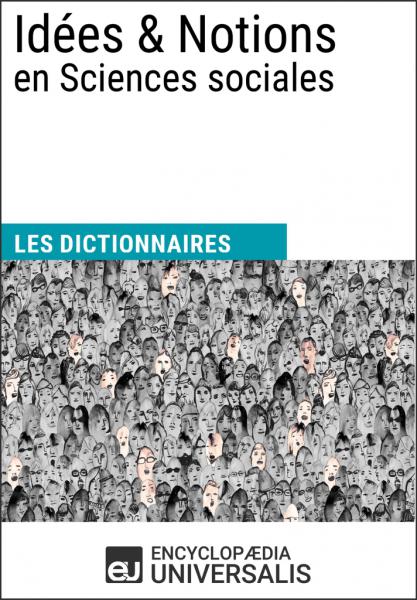 Idées & Notions : joli titre pour une collection consacrée au savoir. Mais comment se relient les deux faces de ce diptyque? Il est possible de le dire en peu de mots. Le volet « idées » traite des courants de pensée. Il passe en revue les théories, manifestes, écoles, doctrines. Mais toutes ces constructions s'élaborent à partir de « notions » qui les alimentent. Les notions sont les briques, les outils de base de la pensée, de la recherche, de la vie intellectuelle. Éclairons la distinction par un exemple : l'inconscient est une notion, le freudisme une idée. Les droits de l'homme, la concurrence ou l'évolution sont des notions. La théologie de la libération, la théorie néo-classique ou le darwinisme sont des idées. Notions et idées sont complémentaires. Les unes ne vont pas sans les autres. Notions et idées s'articulent, s'entrechoquent, s'engendrent mutuellement. Leur confrontation, qui remonte parfois à un lointain passé, tient la première place dans les débats d'aujourd'hui. La force de cette collection, c'est de les réunir et de les faire dialoguer. Le présent volume sélectionne idées et notions autour d'un thème commun : Dictionnaire des Idées & Notions en Sciences sociales.
Idées & Notions : joli titre pour une collection consacrée au savoir. Mais comment se relient les deux faces de ce diptyque? Il est possible de le dire en peu de mots. Le volet « idées » traite des courants de pensée. Il passe en revue les théories, manifestes, écoles, doctrines. Mais toutes ces constructions s'élaborent à partir de « notions » qui les alimentent. Les notions sont les briques, les outils de base de la pensée, de la recherche, de la vie intellectuelle. Éclairons la distinction par un exemple : l'inconscient est une notion, le freudisme une idée. Les droits de l'homme, la concurrence ou l'évolution sont des notions. La théologie de la libération, la théorie néo-classique ou le darwinisme sont des idées. Notions et idées sont complémentaires. Les unes ne vont pas sans les autres. Notions et idées s'articulent, s'entrechoquent, s'engendrent mutuellement. Leur confrontation, qui remonte parfois à un lointain passé, tient la première place dans les débats d'aujourd'hui. La force de cette collection, c'est de les réunir et de les faire dialoguer. Le présent volume sélectionne idées et notions autour d'un thème commun : Dictionnaire des Idées & Notions en Sciences sociales.
Encyclopædia Universalis (2016). Dictionnaire de la Sociologie : (Les Dictionnaires d'Universalis). France: Encyclopaedia Universalis.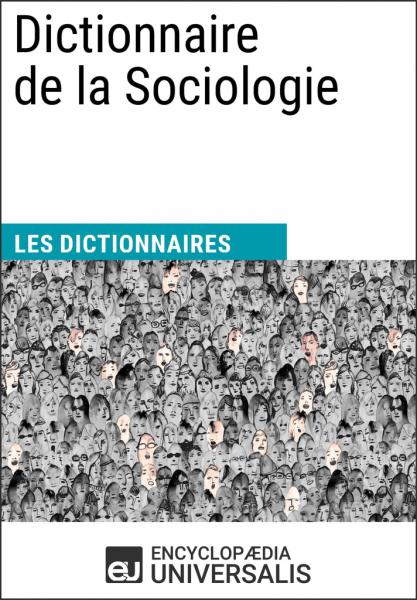 Le Dictionnaire de la Sociologie d'Encyclopaedia Universalis dresse un large panorama de la sociologie contemporaine, de son histoire et des courants qui la traversent. Si on considère la sociologie comme « l'étude scientifique des faits sociaux humains », cette science moderne et en prise sur son temps apparaît comme très éclatée. La vitalité de ses analyses, la pluralité croissante de ses perspectives et l'émergence de nouveaux champs de recherche expliquent cette diversité. Le principal atout du Dictionnaire de la Sociologie est justement de rendre compte de ce foisonnement d'idées et de débats en entrecroisant les articles consacrés aux concepts clés de la sociologie et ceux qui présentent les sociologues et leurs travaux. Émile Durkheim, fondateur de la sociologie française, soulignait que « s'il existe une science des sociétés, il faut bien s'attendre à ce qu'elle ne consiste pas dans une simple paraphrase des préjugés traditionnels[…], car l'objet de toute science est de faire des découvertes et toute découverte déconcerte plus ou moins les opinions reçues ». En près de 250 articles, signés par les meilleurs spécialistes, le Dictionnaire de la Sociologie témoigne, à l'intention des étudiants et des praticiens de la discipline, de cet esprit de découverte. 1500 pages. Plus de 120 auteurs, parmi lesquels Luc Boltanski, Raymond Boudon, Pierre Bourdieu, François Bourricaud, Nathalie Heinich, Claude Lefort, Christian Pociello…
Le Dictionnaire de la Sociologie d'Encyclopaedia Universalis dresse un large panorama de la sociologie contemporaine, de son histoire et des courants qui la traversent. Si on considère la sociologie comme « l'étude scientifique des faits sociaux humains », cette science moderne et en prise sur son temps apparaît comme très éclatée. La vitalité de ses analyses, la pluralité croissante de ses perspectives et l'émergence de nouveaux champs de recherche expliquent cette diversité. Le principal atout du Dictionnaire de la Sociologie est justement de rendre compte de ce foisonnement d'idées et de débats en entrecroisant les articles consacrés aux concepts clés de la sociologie et ceux qui présentent les sociologues et leurs travaux. Émile Durkheim, fondateur de la sociologie française, soulignait que « s'il existe une science des sociétés, il faut bien s'attendre à ce qu'elle ne consiste pas dans une simple paraphrase des préjugés traditionnels[…], car l'objet de toute science est de faire des découvertes et toute découverte déconcerte plus ou moins les opinions reçues ». En près de 250 articles, signés par les meilleurs spécialistes, le Dictionnaire de la Sociologie témoigne, à l'intention des étudiants et des praticiens de la discipline, de cet esprit de découverte. 1500 pages. Plus de 120 auteurs, parmi lesquels Luc Boltanski, Raymond Boudon, Pierre Bourdieu, François Bourricaud, Nathalie Heinich, Claude Lefort, Christian Pociello…
